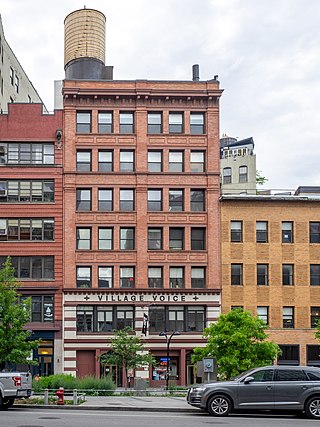Related Research Articles

The Pulitzer Prize is an award administered by Columbia University for achievements in newspaper, magazine, online journalism, literature, and musical composition in the United States. It was established in 1917 by provisions in the will of Joseph Pulitzer, who had made his fortune as a newspaper publisher.

The Village Voice is an American news and culture publication based in Greenwich Village, New York City, known for being the country's first alternative newsweekly. Founded in 1955 by Dan Wolf, Ed Fancher, John Wilcock, and Norman Mailer, the Voice began as a platform for the creative community of New York City. It ceased publication in 2017, although its online archives remained accessible. After an ownership change, the Voice reappeared in print as a quarterly in April 2021.

The muckrakers were reform-minded journalists, writers, and photographers in the Progressive Era in the United States (1890s–1920s) who claimed to expose corruption and wrongdoing in established institutions, often through sensationalist publications. The modern term generally references investigative journalism or watchdog journalism; investigative journalists in the US are occasionally called "muckrakers" informally.

Robert Upshur Woodward is an American investigative journalist. He started working for The Washington Post as a reporter in 1971 and now holds the title of associate editor.

Alexander Claud Cockburn was a Scottish-born Irish-American political journalist and writer. Cockburn was brought up by British parents in Ireland, but lived and worked in the United States from 1972. Together with Jeffrey St. Clair, he edited the political newsletter CounterPunch. Cockburn also wrote the "Beat the Devil" column for The Nation, and another column for The Week in London, syndicated by Creators Syndicate.
Joe Conason is an American journalist, author and liberal political commentator. He is the founder and editor-in-chief of The National Memo, a daily political newsletter and website that features breaking news and commentary. Since 2006, he has served as editor of The Investigative Fund, a nonprofit journalism center.

Barbara Jill Walters was an American broadcast journalist and television personality. Known for her interviewing ability and popularity with viewers, she appeared as a host of numerous television programs, including Today, the ABC Evening News, 20/20, and The View. Walters was a working journalist from 1951 until her retirement in 2015. Walters was inducted into the Television Hall of Fame in 1989, received a Lifetime Achievement Award from the NATAS in 2000 and a star on the Hollywood Walk of Fame in 2007.
The Smoking Gun is a website that posts legal documents, arrest records, and police mugshots on a daily basis. The intent is to bring to the public light information that is somewhat obscure or unreported by more mainstream media sources. Most of the site's content revolves around historical and current events, although it also features documents and photos relating to out-of-the-ordinary crimes and people.

Robert Thomas Christgau is an American music journalist and essayist. Among the most well-known and influential music critics, he began his career in the late 1960s as one of the earliest professional rock critics and later became an early proponent of musical movements such as hip hop, riot grrrl, and the import of African popular music in the West. Christgau spent 37 years as the chief music critic and senior editor for The Village Voice, during which time he created and oversaw the annual Pazz & Jop critics poll. He has also covered popular music for Esquire, Creem, Newsday, Playboy, Rolling Stone, Billboard, NPR, Blender, and MSN Music, and was a visiting arts teacher at New York University. CNN senior writer Jamie Allen has called Christgau "the E. F. Hutton of the music world – when he talks, people listen."

The Center for Public Integrity (CPI) is an American nonprofit investigative journalism organization whose stated mission is "to counter the corrosive effects of inequality by holding powerful interests accountable and equipping the public with knowledge to drive change." It won the 2014 Pulitzer Prize for Investigative Reporting, and in 2023, the Edward R. Murrow Award for General Excellence.

Richard Behar is an American investigative journalist. Since 2012, he has been the Contributing Editor of Investigations for Forbes magazine. From 1982 to 2004, he wrote on the staffs of Forbes, Time and Fortune. Behar's work has also been featured on BBC, CNN, PBS, FoxNews.com and Fast Company magazine. He coordinates Project Klebnikov, a media alliance to probe the Moscow murder of Forbes editor Paul Klebnikov. He is writing a book about Bernard Madoff. Behar is editor of Mideast Dig.
Brian Krebs is an American journalist and investigative reporter. He is best known for his coverage of profit-seeking cybercriminals. Krebs is the author of a daily blog, KrebsOnSecurity.com, covering computer security and cybercrime. From 1995 to 2009, Krebs was a reporter for The Washington Post and covered tech policy, privacy and computer security as well as authoring the Security Fix blog.
David Leigh is a British journalist and writer who was the investigations editor of The Guardian and is the author of Investigative Journalism: a survival guide. He officially retired in April 2013, although Leigh continued his association with the newspaper.

Christopher John Chivers is an American journalist and author best known for his work with The New York Times and Esquire magazine. He is currently assigned to The New York Times Magazine and the newspaper's Investigations Desk as a long-form writer and investigative reporter. In the summer of 2007, he was named the newspaper's Moscow bureau chief, replacing Steven Lee Myers.

Johann Eduard Hari is a British-Swiss writer and journalist who wrote for The Independent and The Huffington Post. In 2011, Hari was suspended from The Independent and later resigned, after admitting to plagiarism and fabrications dating back to 2001 and making malicious edits to the Wikipedia pages of journalists who had criticised his conduct. He has since written books on the topics of depression, the war on drugs, and the effect of technology on attention span.

David Michael Carr was an American columnist, author, and newspaper editor. He wrote the Media Equation column and covered culture for The New York Times.

Pranknet, also known as Prank University, was an anonymous prank calling virtual community that was involved in a string of malicious pranks and instances of telephone harassment, especially during 2009–2011. Their pranks were coordinated through an online chat room, and convinced others to cause damage to hotels and fast food restaurants of more than $60,000. The group was founded by a man who later referred to himself as "Dex1x1", later identified as a Canadian named Tariq Malik. The group has been linked to nearly 60 separate incidents.

Callum Macrae is a Scottish filmmaker, writer and journalist currently with Outsider Television, which he had co-founded with Alex Sutherland in 1993.

Lou Kilzer was an American investigative journalist and author and a two time Pulitzer Prize Winner.
References
- 1 2 3 "Backgrounder: William Bastone". BullPen. Retrieved March 17, 2013.
- 1 2 Keefer, Bryan. "William Bastone on James Frey and The Smoking Gun: Columbia Journalism Review". CJR. Retrieved March 17, 2013.
- ↑ Wiese, Cleve. "Backgrounder: William Bastone". Bullpen. Arthur L. Carter Journalism Institute . Retrieved February 1, 2010.
- ↑ Bleier, Thomas E.; Steinert, Eric C. (2000). Net.people: the personalities and passions behind the Web sites. Information Today, Inc. p. 253. ISBN 978-0-910965-37-8 . Retrieved January 31, 2010.
- ↑ Bialik, Carl (February 17, 2006). "An Interview With The Smoking Gun". Gelf Magazine . Retrieved February 1, 2010.